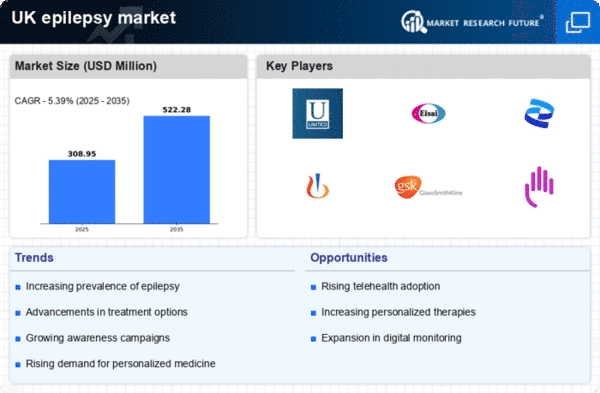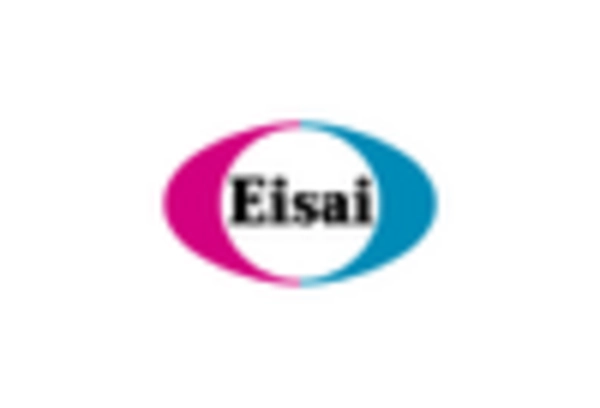Rising Prevalence of Epilepsy
The increasing prevalence of epilepsy in the UK is a crucial driver for the epilepsy market. Recent estimates suggest that approximately 600,000 individuals in the UK are living with epilepsy, which translates to about 1 in 100 people. This growing patient population necessitates enhanced treatment options and healthcare services, thereby stimulating demand within the epilepsy market. Furthermore, the rise in awareness regarding epilepsy and its symptoms has led to more individuals seeking medical attention, contributing to the overall growth of the market. As healthcare providers focus on improving patient outcomes, the need for innovative therapies and management strategies becomes more pronounced, indicating a robust trajectory for the epilepsy market in the coming years.
Government Initiatives and Support
Government initiatives aimed at improving healthcare access and support for epilepsy patients play a pivotal role in shaping the epilepsy market. The UK government has implemented various policies to enhance the quality of care for individuals with epilepsy, including funding for research and public health campaigns. These initiatives are designed to raise awareness, reduce stigma, and promote early diagnosis and treatment. As a result, the epilepsy market is likely to benefit from increased funding and resources allocated to epilepsy care. Moreover, the establishment of specialized epilepsy clinics and support networks further underscores the commitment to improving patient outcomes, thereby fostering growth within the market.
Growing Demand for Antiepileptic Drugs
The demand for antiepileptic drugs (AEDs) is a significant driver of the epilepsy market. With a variety of AEDs available, including newer generation medications that offer improved efficacy and safety profiles, patients are increasingly seeking effective treatment options. The UK market has witnessed a shift towards the use of these advanced medications, which are often preferred due to their reduced side effects and better tolerability. As the understanding of epilepsy evolves, healthcare providers are more inclined to prescribe these innovative therapies, thereby propelling the growth of the epilepsy market. The ongoing development of novel AEDs is expected to further enhance treatment options, catering to the diverse needs of patients.
Advancements in Diagnostic Technologies
Technological advancements in diagnostic tools are significantly impacting the epilepsy market. Innovations such as high-resolution MRI and advanced EEG techniques have improved the accuracy of epilepsy diagnoses, allowing for timely and effective treatment interventions. The UK has seen a surge in the adoption of these technologies, which enhances the ability of healthcare professionals to identify specific types of seizures and tailor treatment plans accordingly. This shift towards precision in diagnosis not only improves patient outcomes but also drives the demand for specialized medications and therapies within the epilepsy market. As diagnostic capabilities continue to evolve, the market is likely to experience sustained growth, reflecting the importance of accurate diagnosis in managing epilepsy.
Increased Focus on Patient-Centric Care
The shift towards patient-centric care is transforming the landscape of the epilepsy market. Healthcare providers are increasingly prioritizing the individual needs and preferences of patients, leading to more personalized treatment approaches. This trend is evident in the development of tailored therapies and comprehensive care plans that consider the unique characteristics of each patient. In the UK, this focus on patient engagement and shared decision-making is fostering a more collaborative healthcare environment. As patients become more involved in their treatment choices, the demand for diverse therapeutic options is likely to rise, driving innovation and growth within the epilepsy market. This evolution towards patient-centric care reflects a broader trend in healthcare, emphasizing the importance of addressing the holistic needs of individuals living with epilepsy.
















